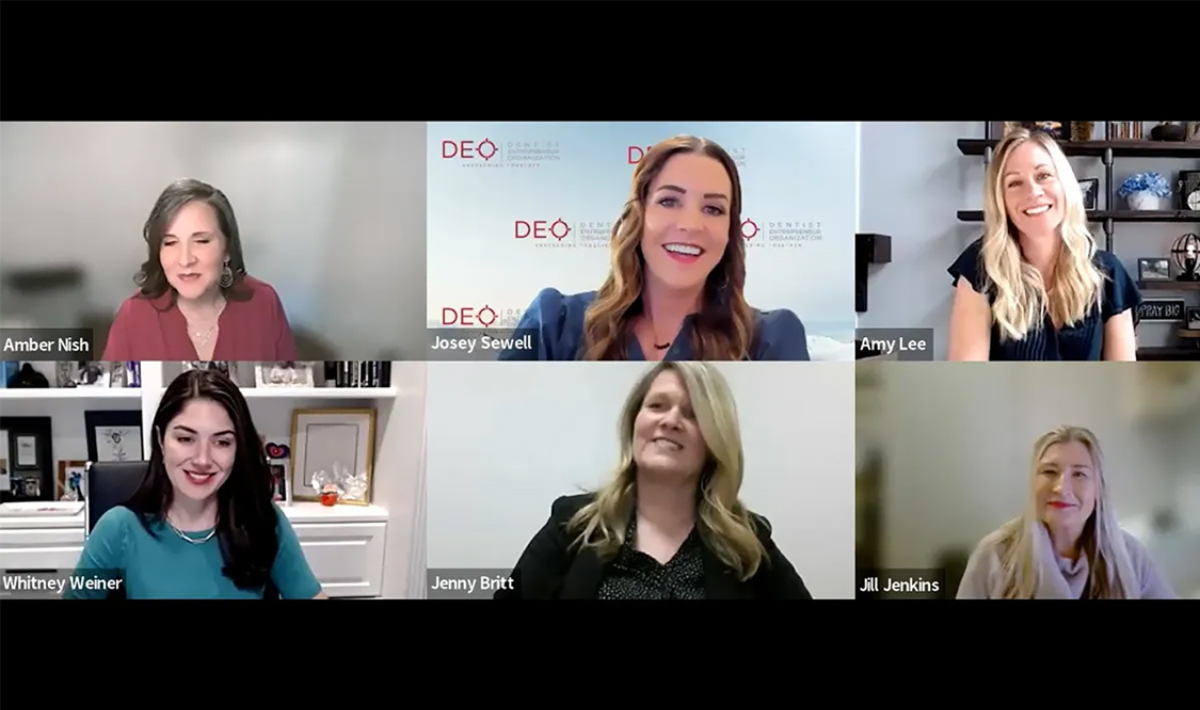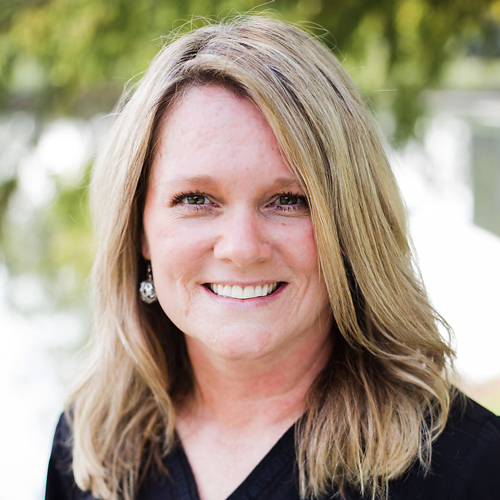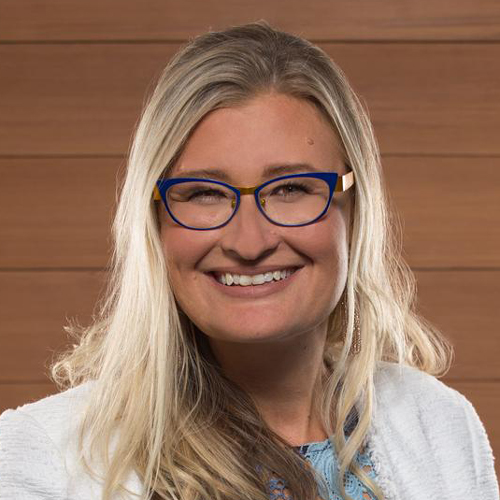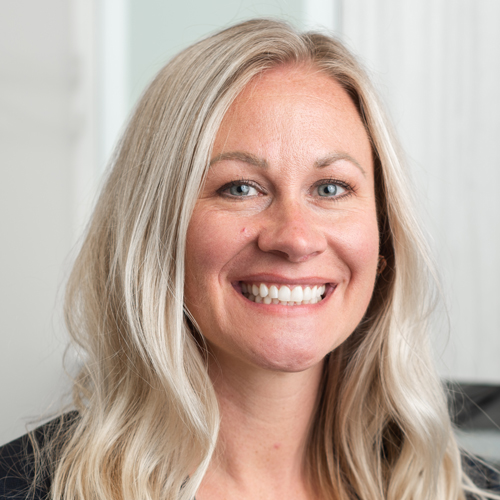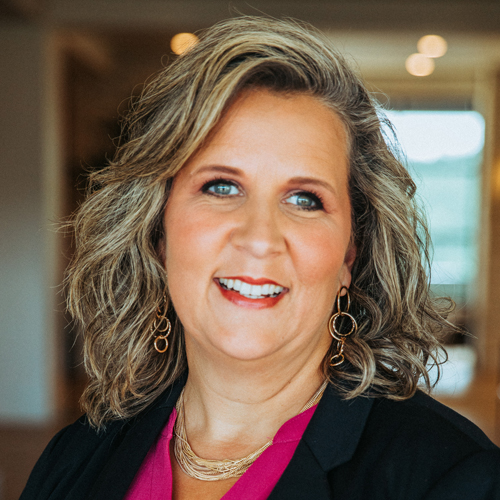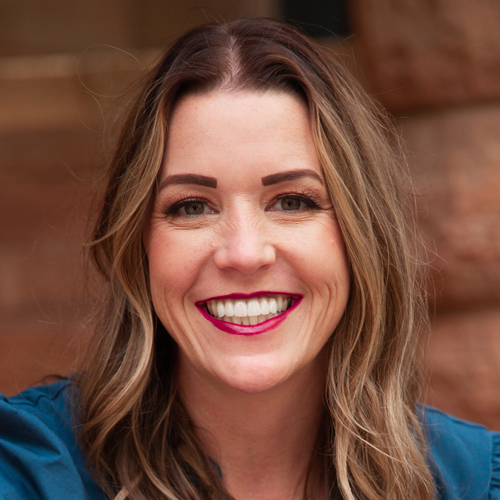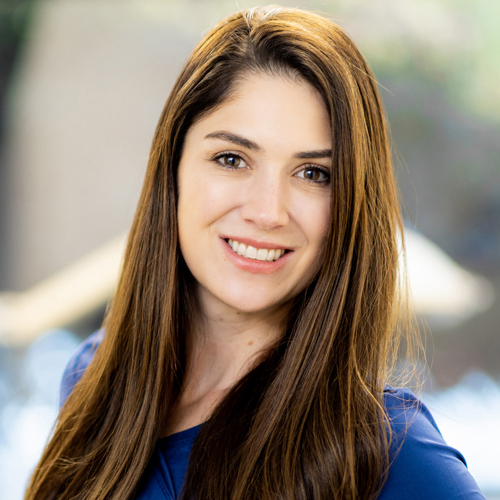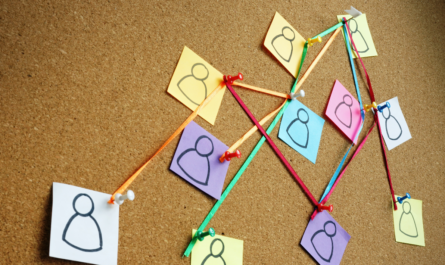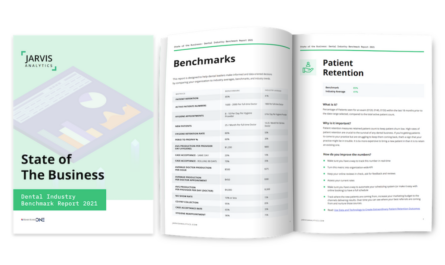The hopes, dreams, challenges and experiences of successful female DSO leaders.
Numbers matter. At a dental group practice, how could they not? But for Jenny Britt, they don’t fully measure the success of an organization. Women leaders perhaps understand this innately, she said.
Women have compassion, empathy, and grace. “We’re not just about hitting a number,” she said in a recent DEO Women Leaders panel discussion. “What led us to that number? What are all the great things that we did? How many people did we take great care of? Do we take great care of each other? Because that truly shows within the numbers. That is definitely one of the unique abilities of women in leadership, in business and in dentistry.”
DEO Partner Josey Sewell recently hosted a wide-ranging discussion with several women leaders in group dentistry, including Britt, who shared the strengths that women bring to their organizations, obstacles they’ve overcome, how to prioritize one’s time with work and family, and what they would tell their younger selves. The following are portions of the panel discussion.
Josey Sewell: What leadership strengths do you believe are perhaps more innate to women than men?
Amy Lee: I think one thing that we are good at is socializing … We’re always trying to find a way to socialize, connect, and help each other, whether it’s tutoring a child, getting them to dance practice, etc. I was just at my daughter’s dance practice, and a parent was recording another person’s child and sending it to them because they couldn’t be there.
Whitney Weiner: To me, a big part of it is the compassion that we bring to the leadership role. There’s so much empathy and compassion in our innate maternal instinct that translates – from leading a family unit to leading a company. Also, the humility and vulnerability of wanting to seek out our blind spots and hire around them. You know, we joke a lot that ego is not your amigo, and I think a lot of female leaders own that. When you show up with a sense of humility and your team feels that it’s okay to fail, it can unlock their potential and help them not be afraid to push the limits and try new things. In our company, we celebrate failure because we fail forward and we’re able to discuss failure openly without it being a negative commentary on someone’s character.
Jill Jenkins: Whitney, I agree with that so much. What people deem soft skills are vitally important to operationalize. I’ll put a plug in for the DEO. The head, heart and hand tools that we utilize allow me to operationalize soft skills, to quantify something that seems traditionally unquantifiable. It opens up those conversations, it allows me to be vulnerable as an owner, and it encourages employees to be vulnerable and have those conversations. So I do believe that’s more unique to a feminine way of leadership than masculine leadership.
Whitney Weiner: Jill, I think you nailed it. The DEO Map, Fit Finder and the 5 Ps all make things less subjective, so now we have analytics to keep score in a way that doesn’t feel so harsh. I don’t know about you, but for me, sometimes numbers just feel so rigid without room for the value of culture and positive energy. So to be able to take all these tools and use them to build out our company’s operating system has been amazing. It has allowed us to marry our soft skills of empathy and warmth of being a mom – while also being a boss and holding people accountable – and have a scorecard for that.
Josey Sewell: Has anybody else struggled with letting their big heart keep them from being profitable in their business?
Whitney Weiner: We’re building awesome things leading with the heart and the head. It’s important to marry the two, I’ve found.
Jill Jenkins: I do think it is a little bit more of a unique challenge for female owners, or female business leaders in general, to want to have that sustainability of emotional intelligence and flexibility in the understanding of their female employees, and then balance that with compassion, empathy and profit. A lot of times for me – and I think the people on this panel probably would agree – as we start with culture and we start with people, profit is an outcome of those things rather than looking at profit as the driver for everything.
Amber Nish: I agree and will add an experience I had when I was a call center director. I had just stepped into that role and my empathy was a little bit of a weakness. I had a team member who was a manager and was going through a divorce. I was a single mom, so I just wanted to make life easy for her in the moment. Jodi Evans was my leader at the time, and she said the best thing I could do for her is give her the ability to provide well for herself and her family.
So along those same lines, you need to be making money to have a mission, right? So helping women build their careers and not cutting corners for them or softening things because of a perceived difficult situation is important. Jody said: “I didn’t do that with you.” The way to empower women is to actually not be soft and allow them to grow and take care of their family. That was a strong leadership lesson for me as I was trying to maybe be overly empathetic. It could have hurt her and the business at the same time if I had followed that course of action.
Josey Sewell: Thank you for sharing. That’s something we all learn along the way, balancing that “Mama mentality” to take people under our wings and make everything OK, versus taking the training wheels off. You’re going to fall down a couple of times, but eventually you’re going to ride this bike on your own and develop some confidence.
That brings us to something interesting. When we were prepping for this call, one of the things we talked about is that there are not enough women in executive positions. There are not enough female owners. We had some really good conversations about what holds women back. What have your experiences been like?
Jill Jenkins: I’ve had generally good experiences, or maybe it’s just my lens that I look at more internal than external. So sometimes I think it’s more knowing how to handle a woman at the table, not having a preconceived bias or anything like that.
Men may be thinking to themselves, is she going to be rude? Is she going to mess up our lunches? Are our dinners not going to be as much fun? But once you break the ice and tell a joke and show you’re willing to have fun, then I’ve had easier success in certain areas because I’m a female, than otherwise.
Whitney Weiner: I think being a woman who went into surgery, that was interesting because the feedback I got was, “How are you going to be a mom?” “Wait, don’t you want to have kids?” “Are you really prioritizing your career… and what about your husband?” And I’m thinking I can do it all. I’m looking at things with rose colored glasses, but so much of it to me is living with an attitude of gratitude.
So yeah, it is interesting when you walk into a meeting full of all doctors and there are only a handful of women there. But I think that there’s a lot of strength in that too. It’s fun sometimes, being the only female at a doctors’ table when it’s a brainstorming mastermind and people are looking to you asking: “How do I relate to my team members?” “What really do they want?” There’s a superpower there that by still being the minority, we have a lot of weight in that conversation.
Jenny Britt: Just to echo what they’ve said, sometimes I actually find it’s very beneficial, because they really want my opinion at first. Sometimes I have to rip off that band aid and they have to hear me come out strong. But often they want to know how to show somebody grace. It gives us the ability to educate, teach and share.
Josey Sewell: I have been very fortunate in my career. Now, there are some definite instances that I look back and I realize I didn’t want to believe that maybe there was an issue because I was a woman. For example, I had a job in the past that we were negotiating and they told me this is the top tier salary, this is the most that we can do. But when they advertised for my position, the base salary was $25,000 more than what they said that they could pay me. Or at one point I was trying to hire somebody, and he did not want to report to me. We had to change our org structure because he just didn’t want to report to a woman.
But I have found I’ve been very lucky to be surrounded by men who value my voice and value what I have to say and want to learn from me and grow with me. But I do think that I’ve had to adapt and learn some things so that I could own my seat at the table.
What about everyone else? Anything you would add to how you’ve adapted to own your seat at the table?
Amy Lee: One time I had a new hire I was talking to about adult sealants. I’m very passionate about preventive care, so I gave him my data and research. The new doctor said he wasn’t sure he agreed with adult sealants. I said, “Well, that’s a great conversation for you to have with Dr. Burch (the owner and a male). And he said, “Well, if Dr. Burch agrees with that, then yeah, I probably agree with you now.” It’s just interesting when those moments happen. They don’t happen often though, honestly. But there’s going to be times when you wonder, is it because I’m a female, or because I’m a dental hygienist?
Josey Sewell: I’m recognizing by talking about this that I’ve seen a lot of women do very well with the ability to lead through others.
Amy Lee: I agree with you Josie. Having a mentor program in each department, I have learned that if you are a mentor, you might not be the mentor for that person, and your job could be to find them a better mentor that might fit their needs. For me, there have been so many times where I went to a different mentor and said, “You know, she’s just not responding the way that I think she could respond. Could you take on this task?” Once you realize that maybe you’re not the mentor for them, and then you give them someone else, then they get to succeed and blossom. It’s fun to watch even though it’s not you that that did it.
Josey Sewell: Sometimes it’s actually not our male counterparts that we struggle with, but other women. Let’s talk about that for a minute. Anybody have an idea or an experience they want to jump in and share?
Jenny Britt: So even for myself through my professional growth, I had to learn how to celebrate others and how to raise others up. It was difficult talking about the idea of letting somebody else deliver if I built it and letting somebody else have the credit for it. You just have to get to a place of being confident in yourself and actually wanting to raise them up around you.
That was a place of learning for me years ago. Five or six years ago, it felt a little bit more like competition.
Now I want them to be as strong as I am. I am no stronger than the folks that I surround myself with. That’s been huge for me, especially the last couple of years, to raise up the women that are around me … I think that just adds a whole other dynamic to women and leadership. It’s a humbling moment and it’s a great place to be in when you can watch them succeed. You give them the tools and they just run and grow.
Amber Nish: When we go to dental conferences, you hear the messaging that there’s not a lot of competition for dental because half of the country isn’t even using their dental benefits, so let’s all learn and grow together. It’s the same with women in leadership. It’s not competition because there’s so much opportunity that we can actually all take a seat at the table and still not fill all the chairs, right? So just the opportunity to look at that and not see it as competition. The more we link arms, the more we celebrate each other and shine the lights on each other and grow ourselves together, there is room at the table because there is such a deficit. It’s not like there are so many women sitting in leadership positions that we have to claw our way to the top. Supporting each other and helping each other gets us all there in what is going to be an equalized number of seats at the table eventually.
Josey Sewell: How do women hold themselves back, and how can we overcome those obstacles?
Jill Jenkins: In my prior partnership I was 100% anti numbers and biometrics. I thought they were unfair, barbaric, and too black and white. I never embraced them, because of the way they were presented to me, in more of a masculine business world, for profit, etc. What I’ve learned over this last year is finding a way to humanize numbers and metrics, and relate them to people and impact. I feel like I’m a better business owner and person. Now I honestly can say I really love numbers. I love to know what we’re doing, but I tell my team it’s not as a way to penalize them, but as a way to uplift them.
Jenny Britt: Jill, in my opinion, you hit one of the nails on the head as far as what we as women bring to dentistry and leadership in the business of dentistry, Men are more numbers geared. Women have compassion, empathy, and grace. We’re not just about hitting a number. We’re about, “What led us to that number? What are all the great things that we did? How many people did we take great care of? Do we take great care of each other?” Because that truly shows within the numbers. That is definitely one of the unique abilities of women in leadership, in business and in dentistry.
Whitney Weiner: When we talk about production, we wish we could see the [human] impact, but our software doesn’t allow us to do that. Lives touched is how we want to talk, but the metrics don’t allow that. To me, metrics seem so rigid and cold and for-profit. Yet we must look in the mirror and say, guess what, we need to have profit. Profit allows us to do these beautiful things for the people and communities that we serve. So, I think there is a mind shift from the cold, stoic nature of a P&L and what’s at the bottom of it, versus how do we drive change focusing on impact?
Amber Nish: When I was 38 years old, my entire identity was measured by what I defined as a successful mother. Did I read books to my kids every night? Did I make a meal at home? I was super PTA mom. Those were my KPIs, but suddenly I found myself a single, full-time working mom and I was failing at what I had defined success as. I remember having a conversation with a good friend who said to me that motherhood is defined in things you cannot outsource.
If you can pick up someone, somebody can pick up your kid and take them. That doesn’t make them the mother, right? The motherhood is in the relationships and not in the things that I do, whether I cooked a meal or picked it up from across the street. What I had to learn to do to help myself feel more successful is ask, what are those [relationship] metrics? Even at home or in business, we look at those metrics and what we measure and define as success.
I have great relationships with my kids. Even if we’re running late to get them somewhere, we’re going to get them there. Or even if somebody else has to videotape them at the dance practice. My relationships – my connections with my kids, my family and myself – became the new standard for me to measure myself against. That freed me from what was holding me back – the guilt and shame in trying to play all the roles when I became a working mom.
Finding the moments
Josey Sewell: Amber, what you said is just so incredibly beautiful. I want to keep talking about that. With everybody being an owner or an executive in a leadership position, how do you find those moments of connection with the people that matter to you?
One of the things that I have struggled with is my husband and I have traded roles, so he’s a stay-at-home dad and does all of the things that a stay-at-home parent does. He has taken all of it and he’s so good at it to the point that my kids’ gender roles are very reversed to them. My 9-year-old, Lincoln, will say things like, “Mom, why does everybody talk about ‘mom’s’ cooking? Moms don’t cook, dads cook.” And I’ll say, “That’s right, buddy. Dads cook.” Our kids are seeing something very different than maybe what we wanted or thought traditionally.
But how do you find time? What are some of your tricks for being the mom that you want to be while also having this career?
Amy Lee: My husband is in a leader position as well, so we are both juggling full-time schedules and then trying to still be there for a 13-year-old and 14-year-old who are in many sports. It’s all about having a lot of conversations between my husband and I. We are constantly talking about what it’s going to look like in the future. When I first moved into the leadership team right after Covid, I told him my identity is about to change. Who I am is about to change our whole dynamic and our household is about to change. I’m not going to be the grocery shopper and it’s not my chore to do the laundry. It’s our chore and it’s the kids’ chore.
You have to give up the idea that there’s going to be equal chores given out. You must give up the idea of perfection. Your house is not going to always look amazing. When you have two high-level executive leadership positions going on in the house, you’re going to have to depend on other people.
I celebrate little wins. In the car, I make sure that the kids are off all screens. They’ve always had that rule. There’s no iPad, phones, or tablets to watch movies. We recently drove to Tennessee, a 12-hour drive, without screens there or on the way home.
We make it a purpose to find the little times that we can connect with our children like driving in a car, right before bedtime, or trying to make sure that we are all seated at least three or four times a night eating dinner together. Right now, we’re watching The Office as a family, because it’s a funny sitcom and it’s something that we’re going to always do. All these little things add up at the end.
Whitney Weiner: Amy, I would echo that. My husband is an executive and has quite a large role. When I was in private practice as a periodontist five days a week, it was really challenging. For example, if our kids were sick, I couldn’t cancel my day because the entire team was depending on me, and he also couldn’t cancel his day. So we really needed to lean on helpers outside of our family. I’ll be honest, at first that was hard, and I think that also in the the mom world, there’s a lot of judgment on that.
In full transparency, we have a housekeeper and a full-time nanny. Those are the people that allow us to be present. We spend a lot of time talking with our kids about quality time. We have family dinner as much as we can, at least three to four nights a week. My husband and I, since having our second kid, have a date night every Tuesday. Saturday night we try and go out with friends. We try and focus on the kids, and then also on one-on-one time, with our boys and with each other. I don’t know if you guys do this, but I try and have one-on-one time with each of my three boys at least a couple times a month, and that’s really special.
I focus not so much on the quantity, but the quality of those experiences. My Google calendar is crazy, but I’m a big believer in optimizing time. I will put on the calendar time for my kids and for my husband. We have the different color codings for kids, sports and things like that. It helps to make sure that we have that balance. I want to have the same intention that I have going into a meeting, negotiating the refinance of a practice with the bank as I have showing up for my son to take him to go paint some pottery.
Amber Nish: Whitney, I love that you called out some support at home. That was a major obstacle for me. I was the one who thought my kids were not going to grow up well cared for and well parented if I didn’t teach them to scrub bathrooms and do Saturday chores. I was working like a crazy person all week and then Saturday morning I’m fighting with my kids to get them up and doing chores because I’m going to teach this lesson. The best gift I ever gave myself was a housekeeper that comes on Fridays. The kids still have to pick up, but I now get to spend Saturday mornings with them at their events doing what we love together.
I traded valuable quality time with them, and that was a privilege that I had worked hard to earn. It was a place that I needed to be, to protect my relationship with them. I was tired of spending the few hours that I got with them fighting about cleaning up the bathroom properly.
Whitney Weiner: Amber, we talk about that too. I think it’s a beautiful space to teach them appreciation. We say, “Aren’t we so thankful that these people help our family so mommy and daddy can be present with you?” Then seeing our boys say thank you to the people who work in our home is another special gift. I love that versus the mom guilt of, oh there’s two cars parked here, we have too much help. I’m so grateful that we’re able to do this.
Josey Sewell: I love that. It’s the same at our house. We have somebody that comes and cleans every couple of weeks and it’s my favorite day of the week because I walk out of my office and the house smells so good.
I have three children. My oldest is 20, but has significant special needs … so in my home there is constant focus on Ethan. We’ve talked about needing some extra help with Ethan. My brother and his wife are here right now, and it’s such a blessing to have another pair of hands. I had to let go like you did Amber. What are my children learning from watching mom build a business and help people? They may not be able to fold a fitted sheet, but they can YouTube for that. They’ll be all right.
Jill Jenkins: It’s so interesting that you were talking about building a business and trying to balance these things. I’ve found, especially leaving a long-time partnership and starting fresh two years ago, it was a major life transition. Sharing all the ups and downs and vulnerabilities about that with my family when we’re together I found to be such a huge learning thing for them, but then such a chance for them to support me. This was such a celebration of my family when we moved into this. I think sometimes we tend to try to do our kids’ stuff and then wait till they go to bed and have heavy conversations. We talked about it upfront, and it took a lot of that burden off of me.
I think back to when my kids were little, we had a set date night as well. And sometimes it was our three hours to argue and get it out of our system. Sometimes it was a great way to reconnect. I’m also very adamant about my time with my friends, and time for myself. Once a year I take a long weekend away by myself just to refuel and set my goals. I always calendar time with my girlfriends because I think that’s more valuable than an hour with my therapist. Those are things that we do in our family, but then also for myself.
Jenny Britt: One of my biggest struggles is we’re both extremely full-time in our careers. Having twins, we did it on our own. We are surrounded by family, but both of our families work full-time. Other than that, we’re in the middle of nowhere, so it’s not that easy to get a sitter. We’ve struggled a lot with that. At first, there was no separation between my career and my home. I’ve always given my all to my boys. As long as my five are OK, that’s my priority.
But I’ve had to learn how to say no. The biggest thing I’ve had to learn is how to put those boundaries up and understand that it’s OK to say no. Years ago, I was very much a people pleaser. I wanted to make everybody happy, and I wanted to take care of them. Whatever it was, I had a solution for it. I knew that we could figure it out. It was incredibly hard to say no.
I learned how to cut the phone off. I unplugged. Dr. Harvey tells me to do it more. He’s super encouraging from that aspect, but it’s hard for me to detach.
My boys don’t pick up their cell phones very often. They don’t do a lot of video games. They don’t do a lot of screen time because they do so much at school. As soon as I can get home and change, we’re outside, we’re outdoors, and I’ve learned how to leave my phone behind.
Amy Lee: Jenny’s story reminds me of Dr. Eric Roman when I heard him say, “It’s going to be a ‘hell yes,’ or it’s a ‘hell no.’” I took that on a personal level. If you don’t want to go somewhere on the weekend, then it’s a no. But if you are all excited about it because your time is very valuable, then go for it. Say yes.
Whitney Weiner: It’s so hard to say no. I don’t know about you guys, but especially with so many opportunities in every direction, you get overtaxed. It’s that hyper-focus on time and being present. There’s so much power in the no, even when it’s uncomfortable. Boundaries are healthy and it seems like sometimes they’re not portrayed that way.
Josey Sewell: Absolutely. I’ve heard a phrase that the kindest word in the English language is no. These are great tips – getting help, letting go, being really intentional, setting time on the calendar, making sure you have time for yourself, setting boundaries, being outside.
One habit I’ve kept up is I will lay down with my kids when it’s bedtime. So first it’ll be with my son and we’ll read a book. Then I’ll go to my daughter and we’re talking about boys and school and girls and all of these things. Then with my oldest son with special needs, he just wants to sit and be loud and cuddle with mom for a minute.
But that keeps me grounded and connected to them, even when I’m tired and I want to go to bed. I’m leveraging it and keeping it as long as I can.
A question for your younger self
Josey Sewell: One last question. What would be one piece of advice that you would share with the younger version of yourself?
Amber Nish: In my younger, very small, narrow-minded self, I believed that the one path to joy and happiness for me and the right thing for me to do was be a stay-at-home mom – the white picket fence. I never allowed myself to even imagine that I could be both, that I could have a career. Life transitioned, and it forced me to learn. It’s been the best journey of my life. So just to be able to tell myself at a young age that yes, you can’t do it all perfectly, but you’ll figure that out after you’re 30. You can have a full life with lots of different hats on and be a good mom at the same time.
Jill Jenkins: I’ll jump in. I would’ve liked to have been more curious. I have always had a good sense of intuition. But a lot of times, because I wasn’t curious, I would get pulled in different directions, and I think if I would’ve gotten curious and asked questions, then I may have clarified things for myself a lot sooner. So don’t be afraid to get curious and ask questions.
Jenny Britt: For me, it’s don’t be afraid to fail. That’s where I have grown and learned so much, and I used to be so scared of that.
Whitney Weiner: I was going to say the exact same thing. There’s strength in failure. There’s launch, lessons, and growth. Lean into that and trust yourself and your own intuition.
Amy Lee: I was a late bloomer in school and life in general. I was always behind in reading and math and went to see a special teacher to help me get back into grade level. Because of those classes, by middle school I was on grade level, but I had this low, self-conscious confidence that I didn’t think I could achieve anything. I would’ve told myself, “Hey, you’re just late to the game, but you can achieve so much more. Just start doing and just say yes and go.” And like Jill and Jenny said, don’t be afraid to fail. Keep failing and learn faster that way.
Josey Sewell: Thank you so much for sharing, Amy. I would probably tell myself that it will all make sense. It will all come together. I had a great deal of trauma when I was growing up. My dad died when I was young in a horrible car accident. It was one traumatic event after the other. Yet as I look at who I am today, and even having a child with special needs, I recognize every difficult thing that happened in my life has given me the ability to connect with other people, to love other people and to understand them.
I think it has prepared me to be the woman that I am today and the way that I show up as a wife and a mom, as a coach, all sorts of other things. So yes, I would probably just say to my younger self that it will all work for your benefit.
Listen to our DEO Growth Secrets Podcast
Women Leaders Panel
Jenny Britt is the Director of Operations for Sound Dental Partners. Jenny began her professional career as a dental hygienist in 2005. Her passion for dentistry, coupled with her business background, led to an interest in the business side of dentistry. For years, alongside clinical dental hygiene, Jenny traveled from coast to coast, learning from the top consultants in dentistry while developing sound systems for her day to day. In 2013, Jenny joined Dr. Will Harvey and transitioned into the leadership and business side of dentistry full time. One of her main goals is to take great care of people, be that her family, patients, team or business partners. Jenny is married with three boys, living in Eastern North Carolina. She enjoys anything outdoors, from gardening, reading, animals, boating and fishing. Jenny serves on the advisory board for her local Dental Hygiene Program.
Dr. Jill Jenkins is the owner and President of Jenkins Dentistry for Kids, a pediatric specialty practice with two locations in the Kansas City area. She attended both dental school and her pediatric residency at the University of Missouri Kansas City School of Dentistry. After partnering to build her original practice of 15 years, Jenkins and LeBlanc, Dr. Jenkins expanded on her own unique skills and practice philosophy to open Jenkins Dentistry for Kids in 2020. Beyond creating a ripple of positive dental experiences and a lifetime of oral health for her young patients, Dr. Jenkins is dedicated to growing a team of dental professionals who experience ripples of joy through their own lives by working in a values driven and sustainable organization, benefiting patients, team members and the community she serves. Dr. Jenkins is married with three children and is continually grateful for the support and love of her family.
Amy Lee, RDH, sits on the executive leadership team at Burch Dental Partners, Rockford, Illinois, as the Director of Clinical Operations. She has over 18 years of clinical hygiene experience and is also a teacher, coach, and mentor, supporting 12 dental offices, from general to specialty. She is an expert at motivating an entire dental team to act on a shared purpose, resulting in better lifelong care for patients, healthier team culture, and higher cash flow for owners. Outside of work, you can find Amy spending time with her husband boating, admiring her daughter competitively dancing, and cheering her son on in his many sport activities. Amy can be reached at amylee@burchdental.com.
Amber Nish, is Chief Marketing Officer at Revolutionary Tribes, a consultancy agency that works with Dentist Support Organizations and Dental Group Practice Leaders. Revolutionary Tribes loves to help people and teams accelerate and achieve their vision. Amber firmly believes that people are our greatest asset and that by surrounding yourself with great people, you’ll inevitably get great results. As a single mom and strong female leader, she’s passionate about helping other women identify and develop their own leadership strengths. Amber currently lives in Krum, TX (go, Bobcats!) with her five children and spends much of her time engaging in fun activities with her kids.
Josey Sewell, RDH, is a dentistry expert in applying an operating system in dental groups to help them clarify their vision, focus on what matters, and achieve improved team health. She has unique expertise and the ability to weave together sound business systems and team development strategies. Her development programs have empowered leaders and executives to find more joy in their work and control of their business.
Dr. Whitney Weiner, with an emphasis on education, open communication, and tailored care, is the Founder and CEO of Whole Dental Wellness, empowers her patients and instills in them the autonomy to make the right decision for them. She does not believe in being a jack-of-all-trades like many new dentists try to be; instead, she believes in being a true specialist and ensuring her patients are always treated by the best of the best. In 2016, Dr. Weiner was chosen as one of the “Top 25 Women in Dentistry” by Dental Product Report and named the “Most Interesting Person in Dentistry” for February by Curasan.com. In 2017, Incisal Edge named her in their top “40 under 40” young, rising dentists in the country. Always at the forefront of dental technology, she attends multiple regional and national professional meetings each year.


